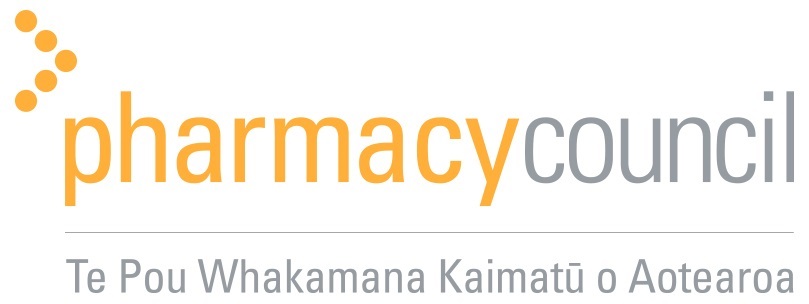
FROM THE COUNCIL CHAIR AND CE
What’s on the horizon for 2024?
Kia ora koutou,
It’s been a productive and positive time at Council, as we processed 4100 plus Annual Practising Certificate (APC) registrations. We’d like to acknowledge the excellent response from the profession, especially as Easter is one of the busiest and most pressured times of the year for pharmacists. Thank you for engaging with us to help deliver a smooth and efficient APC renewal process and most importantly being assured that pharmacists are practising legally, safely and are fit and competent.
We recently had our first Council meeting of the year and are keen to share our work programme for 2024-25. You can read some of the key highlights of planned activities in this newsletter. As an organisation, we’re feeling motivated and focused to meet our strategic priorities, with the confidence of knowing that we have the dedication and support of our Council, operational team and the many who contribute their expertise to our committees, advisory groups, and other forums. Also holding us in good stead is our vision ‘through skilled and safe practice, pharmacists contribute to better health outcomes for New Zealanders’ which underpins and guides all our work.
We pride ourselves on being a nimble and responsive regulator that seeks to embrace change and innovation. As pharmacists expand their roles to meet the rising demand for health services, and our health sector faces ongoing challenges such as workforce shortages, the need to ensure pharmacists are competent and fit to practise to protect public safety is more vital than ever. On this note you can read about what we are doing to strengthen aspects of our regulatory framework across a range of activities such as the new professional standards, accreditation of new pharmacy education programmes, and the pharmacist prescribing scope of practice.
We hope you enjoy reading this newsletter which has updates on key activities, insights to support safe practice, and opportunities to better understand the breadth of Council’s work.
We look forward to connecting with you throughout the year.
Ngā mihi
Arthur Bauld (Chair) and Michael Pead (CE)
IMPORTANT FOR YOU TO KNOW
COUNCIL ELECTION RESULTS
At Council’s meeting in March, an election was held for the positions of Council Chair and Deputy Chair. The election is held at the beginning of each year and is a statutory requirement under the Health Practitioners Competence Assurance Act 2003. While Council members are appointed by the Minister of Health, Council members are responsible for electing the Chair and Deputy Chair positions from within Council.
Arthur Bauld (Ngāti Wai/Ngāpuhi/ Te Rarawa/Ngāti Toa/Ngāti Raukawa) was re-elected as Chair and has now held the role since February 2021. Arthur will be Chair until the end of this year, when the role of Chair will be up for re-election and as he will have served on Council for the limit of three terms. You can read our Q & A with Arthur in this issue of the newsletter.
Two Deputy Chairs were elected who will share the role – Ming-chun Wu, a Chartered Director with the Institute of Directors who has over 16 years’ experience in transforming and improving organisations (re-elected to the role) and Ahmad Zareh, a community pharmacist from Hamilton who is serving his second three-year term. Ahmad will serve as Deputy Chair for the first half of the year, and Ming-chun for the second half of the year. Read the bios of all our Council members here.
NEW COMPETENCE, PHARMACIST PRESCRIBER, AND ACCREDITATION STANDARDS
All Council’s new standards came into effect on 1 April 2024 and form an integral part of Aotearoa New Zealand’s pharmacy profession.
The new competence standards, and pharmacist prescriber standards were developed with strong input and engagement from the profession.
“The profession can feel proud to have ownership of these standards, which promote and uphold high quality pharmacist practice,” says Pharmacy Council CE Michael Pead.
Published and sent to the profession in June last year, the new standards set the required competencies, knowledge, and skills to strengthen the profession’s safe practice and the public’s trust in pharmacists.
A major change in the new competence standards is the inclusion of “Domain 1: Te Tiriti o Waitangi” that describes behaviours to apply Te Tiriti to pharmacy practice, and Māori perspectives of hauora (health and wellbeing).
“In recent years we have developed a stronger understanding of Te Tiriti obligations,” says Michael. “We realised that we needed to refresh the standards for competence, prescribing and accreditation to set clear expectations for culturally safe as well as clinically safe pharmacy practice.”
“We believe the new standards provide greater clarity and guidance, and encourage every pharmacist to read and familiarise themselves with the new standards. Pharmacists can also reach out to their professional associations for support to meet the standards.”
The new accreditation standards for pharmacy programmes set a high-quality bar for pharmacy education providers. The accreditation standards are aligned to the competence standards and were developed following a robust consultation process. This process engaged education providers, pharmacy academics, accreditation experts, pharmacists, and professional associations to seek their insights and feedback to develop the standards.

COUNCIL'S WORK PROGRAMME 2024-25
Council’s budget and work programme for 2024-25 is aligned to our mandate to protect the health and safety of the public by ensuring pharmacists are competent and fit to practise. The bulk of our work (about 90 per cent) is Business-as-Usual (BAU) activities to meet our statutory obligations under the Health Practitioners Competence Assurance Act 2003. BAU priorities include:
- Registration of interns, pharmacists, and pharmacist prescribers and managing the public register of pharmacists which all New Zealanders can access.
- Setting scopes of practice and competencies, as well as providing robust assessment processes for entry into the pharmacists’ scope of practice.
- Overseeing processes to ensure the competence of pharmacists, including recertification requirements.
- Maintaining processes for qualifications and accreditation, including accreditation of pharmacy education programmes.
- Continuing to build the capability of our team and profession to support cultural safety and health equity.
- Considering cases where pharmacists may not be meeting professional and ethical standards, and responding proportionately when standards are not met.
About 10 percent of our work is projects to ensure our regulatory framework is robust, fit for purpose and responsive to current and future pharmacy practice. Projects include:
- Embedding and socialising our new Competence Standards to ensure the profession identifies and adapts to meet these new standards.
- Reviewing how we apply the scope of practice to pharmacist prescribers to ensure the scope is in line with the new Competence Standards. Our key aim is to support safe prescriber practice.
- Developing a positional statement to support safe, innovative practice and services. This will support the profession as it continues to explore and expand into new services.
- Undertaking a review of the Assessment Centre (AC) Blueprint to ensure that intern pharmacists are assessed against the new competence standards.
- Finding a cost-effective replacement for the AC management software, which manages the end-to-end processes of the AC including data gathering and reporting.
- Developing, alongside other Responsible Authorities, unified prescribing principles for all health prescribers.
- Advancing our five-year Digital Investment Strategy to build the IT capability and capacity needed to automate some of our processes, including being able to better analyse and respond to notifications and complaints, as well as strengthen cyber security to protect data.
We remain committed to working with the profession to protect pharmacists’ competent and safe practice, while enabling professionalism to thrive. We look forward to keeping you updated on our work and welcome your feedback.
INSIGHTS TO SUPPORT SAFE PRACTICE - HDC DECISION
Dispensing of incorrect medication and failure to inform GP
The HDC has found a pharmacist who dispensed the wrong medication in breach of professional standards as set out by the Pharmacy Council, and in breach of Right 4 (2) of the Code of Health and Disability Consumers’ Rights (the Code) for failing to provide services that comply with legal, professional, ethical, and other relevant standards.
Case description
A pharmacist incorrectly dispensed acitretin 25mg capsules for a consumer who was prescribed isotretinoin 10mg capsules for acne. The error was picked up when the consumer returned to the pharmacy for a repeat prescription. The pharmacist then dispensed the correct medication and apologised for the error. The pharmacist did not advise the patient of the potential side effects of acitretin, which include avoiding pregnancy for three years to prevent the serious risk of birth deformities.
The pharmacist could not reach the consumer’s GP to alert them to the error and forgot to follow up with the GP. During a later visit to her GP for another matter, the consumer mentioned the dispensing error, and at that point learned of the side effects of acitretin. The pharmacist accepted full responsibility for her error, telling the HDC she had processed the correct medication through the computer software, but had ‘inadvertently dispensed acitretin 10mg in error’ and did not identify the error in her final check.
Role of HDC and Council
The HDC makes enquiries and may investigate complaints when health consumers are affected. Whilst the Pharmacy Council does not investigate the same complaint when it is under consideration by the HDC, it can make enquiries into questions about a pharmacist’s competence or less frequently, the pharmacist’s health.
Due to the serious nature of the concern and shortly after hearing of the error in 2021, the Council asked an independent pharmacist to visit the pharmacist in her practice, and report back to Council. During this visit the pharmacist answered questions about the dispensing error and the factors that may have contributed to the error. The subsequent report informed Council’s decision not to review the pharmacist’s competence at that stage in the process.
The HDC decided to investigate this complaint to determine whether the pharmacist and the pharmacy had breached the Code. The findings make adverse comments about the pharmacist and the pharmacy, including that the right to have services provided that comply with legal, professional, ethical, and other relevant standards was breached.
The HDC considered the Council’s Competence Standards in relation to this Code, and the report includes criticism relating to failure to adhere to standards relating to logical, safe dispensing, monitoring for potential errors, acting promptly to mitigate them and recording medication errors and subsequent interventions to minimise impact of the error and prevent recurrence. The full HDC report is available here.
When considering a complaint relating to a dispensing error, the HDC reviews the pharmacy’s Standard Operating Procedures (SOPs) and will make adverse comments when the pharmacist or pharmacy fails to adhere to the SOPs.
Effective Standard Operating Procedures
Effective SOPs reflect both actual practice at the pharmacy (i.e. pharmacy specific) best practice. Pharmacists have a responsibility to have their own comprehensive and safe dispensing process, but also to contribute to developing and maintaining SOPs that reflect best practice.
Pharmacists responsible for managing pharmacies facilitate the pharmacy team’s shared ownership of SOPs to achieve consistent high-quality performance, to manage risk and to minimise harm. When errors or a near-miss occurs, the team should complete a comprehensive root cause analysis (the link to this tool is accessible to Pharmacy Defence Association members), as part of the investigation and quality improvement processes.
As referenced in the HDC report, dispensing SOPs should cover all aspects of the dispensing process, including being explicit about the pharmacist’s professional input… (the value add) …into the assessment of the safety and appropriateness of a prescription and, in the provision of information and counselling when completed prescriptions are transferred to patients.’ For further information on writing SOPs see guidance on Council’s website.
Pharmacists who make dispensing errors commonly report to Council of being distracted or the pharmacy being busy. Our analysis of the circumstances often raises questions about the degree of critical clinical thinking evident by the pharmacist for the error and whether the pharmacy is adequately resourced.
Critical clinical thinking and keeping clinical knowledge up to date
Many errors could be avoided by the pharmacist assessing the prescription from the clinical perspective to complement the technical check, i.e., ‘effective use of the value add.’ (For example, what is this medicine normally for? Is this a normal dose? Are there any red alerts associated with this medicine? Does it make sense for this patient (age, gender, other medicines/conditions)? Is this the first prescription of this medicine for this patient? What counselling is needed?)
The pharmacist admitted that she was not aware that patients taking acitretin were required to avoid pregnancy for three years. Whilst it is important to verify the data sheet or New Zealand Formulary when you are unsure about clinical details, it is equally important to keep your clinical knowledge up to date, or you may miss a vital clinical detail about a patient’s treatment. Pharmacists will have heightened awareness of certain medicines, for example, because they have high impact (narrow therapeutic index, significant contra-indications, or potential adverse effects) or are prone to cause errors (look-alike and sound-alike). We recommend pharmacists reflect on the currency of their knowledge about medicines but especially on medicines that require a heightened awareness.
Busy pharmacies and the impact on safe pharmacy practice
Pharmacies that are constantly busy may not be adequately resourced for pharmacists to exercise the proper due diligence needed for dispensing. The pharmacist advised HDC that the dispensary was busy when the error occurred, including an increase in interruptions. It is important that pharmacists who manage (or own) pharmacies, facilitate a mature discussion within the pharmacy team about the workload and its impact on safe pharmacy practice. We encourage pharmacists and their teams to review the guidance in Workplace Pressures in Pharmacy and implement strategies to manage the pressures.
|
Relevant Standards in Competence Standards for Aotearoa New Zealand Pharmacy Profession Assesses prescriptions, including applies knowledge in undertaking a clinical assessment of the prescription… (Competency 6.1) considered together with Person-centred Care and Medicines Management (Domain 5). Follows a logical, safe, and methodical procedure to dispense therapeutic products (Behaviour 6.2.1) Monitors the dispensing process for potential errors and acts promptly to mitigate them (Behaviour 6.2.2). Accurately records details of medication incidents and actions taken, including clinical and professional interventions, to minimise their impact and prevent recurrence (Behaviour 6.2.5) and prioritises and learns from risk and incidents for mitigation, prevention, and system improvement (Behaviour 4.1.5). Leads the practice of other team members and supports them to ensure high-quality healthcare (Behaviour 4.1.1). Prioritises and learns from risk and incidents for mitigation, prevention, and system improvement (Behaviour 4.1.5) |
OUR ENGAGEMENT JOURNEY
WHITE COAT CEREMONY
It was a privilege to meet the enthusiastic second year pharmacy graduates at the Otago Pharmacy School White Coat ceremony last month and to welcome them to the profession, says Council CE Michael Pead.
Presenting at the University’s Dunedin campus, Michael told graduates that they “should feel very proud to have chosen a highly respected, trusted, and well-regarded profession. Your commitment to serve the people of Aotearoa through this profession will be rewarding.”
He explained Council’s role to protect the health and safety of the public by ensuring pharmacists remain competent and fit to practise, emphasising Council’s supportive approach to regulation. “Council trusts pharmacists to do the right thing but has tools and guidance to keep pharmacists on track if needed.”

Students joined Michael to recite the Pharmacist’s Code of Ethics, which outlines the core responsibilities and values of the profession – care of the patient, professional integrity, and professional competence.
PROFESSOR RHIANNON BRAUND
Council appreciates its strong working relationship with the Pharmaceutical Society of New Zealand.
We would like to acknowledge and thank Professor Rhiannon Braund for her contribution to the profession as the immediate past president of the Society. Taking on the role in November 2020, she provided sector leadership during the pandemic and health sector reforms. Professor Braund resigned as president to begin a new role in May as head of Aotearoa New Zealand’s third pharmacy school at the University of Waikato. The new postgraduate pharmacy school is scheduled to open in February 2025. Council looks forward to meeting with the new President (the process to elect this role is underway) and the rest of the team soon.
KEEPING YOU UP TO DATE
STRENGTHENING OUR REGULATORY SETTINGS
As the role of pharmacists and pharmacist prescribers expands to meet growing healthcare needs in our communities, Council continues its commitment to make sure our regulatory settings are responsive to changes in the pharmacy landscape. This provides the basis for regulation to be enabling and supportive, rather than an unnecessary barrier.
As part of this ongoing commitment, we are forming a Regulation Development Expert Advisory Group to work alongside Council. The first two areas of work for the group will be to assist Council develop a statement on innovative practice, and to undertake a review of pharmacist prescribers’ registration and recertification requirements.
The group will comprise six independent expert members, with a unique mix of skillsets and experience including regulatory practice, innovative practice, and expertise as a pharmacist prescriber.
Pharmacist prescribers work as part of a collaborative healthcare team and use their clinical skills and expert knowledge of medicines to improve health outcomes across the health and disability sector. Read more about the Regulation Development Expert Advisory Group here.
SUPPORTING GRADUATES TO PRACTISE SAFELY
One of Council’s roles is to accredit and monitor pharmacy education programmes to ensure graduates can practise safely and competently when they register and enter a scope of practice (intern pharmacist, pharmacist, pharmacist prescriber). As we continue to embed accreditation in-house, we are focused on strengthening our accreditation processes. This focus includes working collaboratively with the profession to incorporate the knowledge and experience of senior pharmacy academics and accreditation experts. A key area of expertise is the application of Te Tiriti and hauora Māori to help advise and inform our accreditation of pharmacy programmes.
Just prior to Christmas 2023, Council sought expressions of interest from local and international applicants to serve on Council’s Accreditation Advisory Group (AAG). We were delighted to get such a great response and received applications from 18 outstanding candidates. Short-listing and interviews have been completed for six positions. We expect to hold our first AAG meeting in May.
One of the AAG’s first tasks will be to evaluate information to support the accreditation of the University of Waikato’s new graduate entry Master of Pharmacy qualification, expected to commence in 2025.
VOLUNTARY BONDING SCHEME
New or recent graduate pharmacists are now able to apply for 2024’s Voluntary Bonding Scheme, which seeks to encourage newly qualified health professionals to work in the communities and specialties that Aotearoa New Zealand needs most. This is the first year that pharmacists have been included in the list of health professions under the Scheme.
In exchange for working in hard to staff rural and regional parts of the country, the Scheme provides bond payments to help repay student loans (or as top-up income for those without a loan).
To find out more, including eligibility criteria and how to register, visit the Health NZ Te Whatu Ora website. Registrations of Interest for the Scheme’s 2024 intake closes 16 April.
COUNCIL CHAIR ARTHUR BAULD PROFILE
Council Chair Arthur Bauld is an addictions pharmacist with the Auckland Opioid Treatment Service. He has over 30 years of pharmacy experience in community and hospital pharmacies. Arthur was Co-President of the Māori Pharmacists Association and their representative on the Auckland School of Pharmacy Board of Studies. He has mentored pharmacists, tutored at the Auckland School of Pharmacy and has broad governance experience across academic, regulatory and organisation boards.
 What do you enjoy most about your role on Council?
What do you enjoy most about your role on Council?
The operational team are extremely professional and dedicated and allow me and my fellow Council members to focus on the purpose of Council. We’ve ensured a highly effective culture that knows our role is to “steer the boat” and not to “row it.”
What have been some key lessons for you from your governance experience at Council?
Anyone who has been a member of the Pharmacy Council knows that until you do the role, you have very little understanding that you are responsible for protecting the health and safety of the public, rather than advocating for the pharmacy profession. Pharmacists can often misunderstand what is involved in our regulatory role as well as the broad range of activities regulation covers.
What highlights of Council’s work stand out to you most in your time as Chair?
Council’s members and the operational team developed our own set of values, namely Whaioranga (pursuit of wellbeing), Tikanga (correct processes), Ōritetanga (equity in partnership) and Rangatiratanga (leadership) and a governance charter for the Council. Both were created in such a way that not only gave rise to meaningful foundational outputs, but respected tikanga along the way in the spirit of honouring Te Tiriti o Waitangi.
What are the main opportunities and challenges for Council and the wider profession?
Methodically expanding the scopes of practice to optimise health outcomes and equity for tangata whaiora would seem to be obvious, but the wider challenge for the profession is for the entire pharmacy sector to work cohesively together to achieve that outcome. I would love to see all parties acting together with the needs of the public at the centre of a joined-up plan that is comprehensive and based on clear and well-defined outputs, rather than a hodgepodge of good but random successes. If the driver is truly the health and wellbeing of the tangata whaiora and whānau in front of us, that would make a huge difference.

